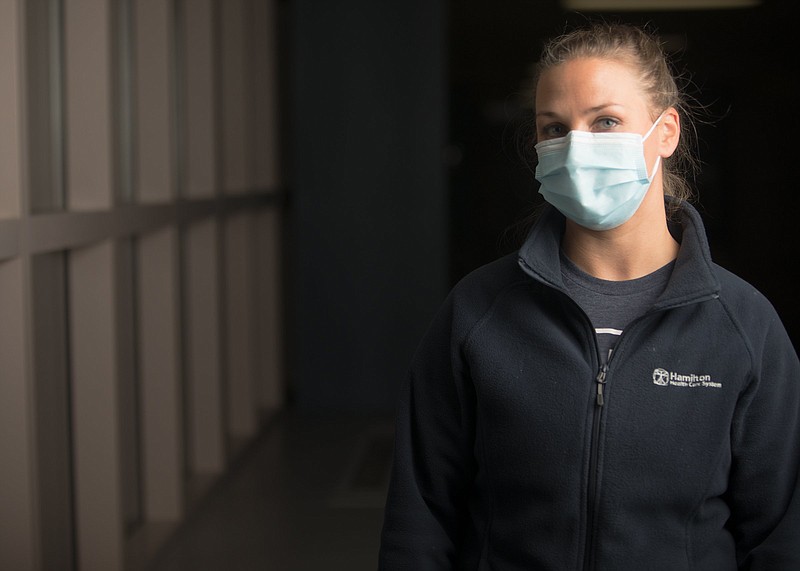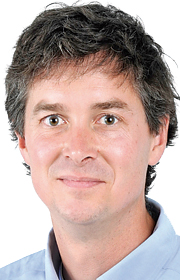For the last 261 days, ever since the coronavirus appeared in this county on March 13, an untold number of men and women have devoted and risked their lives to save ours.
Doctors, nurses, first responders, health care experts - they formed the tip of our spear. These are our COVID-19 soldiers.
They come home exhausted, even traumatized, after hours of intensive care rounds or contact tracing, collapsing into family, only to wake up and go to battle all over again.
Every hour of every day, 261 days and counting.
All for us.
What do we owe them?
How can we honor them?
When this ends, how will we remember them?
Or rather, how will they remember us?
Once this pandemic subsides, we will be asked to look into their eyes. We will see the stories of the coronavirus: the heroism, the fear, the suffering.
We will also see our own image.
Reflected back will be the way we've spent the last 261 days. How we gathered for Thanksgiving. How often we wore our masks. Whether we trusted and listened to them.
Whether we were part of the problem.
Or part of the solution.
So many of you are. For 261 days, you have chosen selflessness, kindness, responsibility. You honored a social contract. You have respected the experts.
"That is love," one friend said.
Yet in the midst of 2020, we also find Chattanooga 2019. Masks abandoned. Warnings ignored. On Thanksgiving Eve - or Blackout Wednesday, one of the most drunken nights of the year - how many bars were packed? Every Sunday, how many churches go mask-less?
Earlier this week, I asked city and county officials: How many individuals have been cited for violations of the mask mandate?
Not one, they said.
Not a single one.
The organizations charged with upholding the law are ignoring it.
It feels like a secession. Like a middle finger. Like "The Truman Show," this own separate bubble of life.
What message does this send to the sick?
Or rather, what message do they send to us?
"I have a beautiful wife and two young children and they are worried that I may die," Dr. Chris Haddock wrote. "To be honest the thought has crossed my mind as well."
Haddock is a beloved physician in Ringgold, Georgia. He is 47, healthy, with no medical problems. On Nov. 10, he tested positive.
Cold and flu-like symptoms became worse. Fatigue and body aches and coughing. Then, pneumonia. Breathing became difficult. (To the surprise of none of his friends, the dedicated Haddock kept seeing patients over tele-health for as long as possible.)
On Nov. 22, as his health plummeted, he posted to Facebook words for all of us.
COVID-19 is real.
"It's not made up. It's not a fake pandemic," he wrote. "Open your eyes, open your minds, and recognize maybe you aren't an expert just because you read something on social media. I'm a scientist. I'm a physician. In this case you're damn right I know more than you, I've read more about [COVID-19] than you, and I have over 20 years experience in the medical field. So pardon me if I no longer have tolerance for ignorant positions, [expletive] data, and the making of points by posting idiotic memes."
"We are seeing near exponential community spread again. The surge is real and it continues to grow. My hospital and emergency room colleagues are sounding the alarm in medical circles locally and are tremendously concerned."
"I'm a libertarian. I want less government interference in my life. I don't want them telling me what I can and can't do. But as I lay here proned in my bed hoping I remain alive for the foreseeable future I don't need the government to tell me that Thanksgiving gatherings are a bad idea. It doesn't take a rocket scientist to look at the current data and understand that any unnecessary gathering of any group is unwise. "
"Sure the odds say it won't be that bad. It won't be that severe. I'm living proof that it does get bad. Do you really want to play the odds just to share a single meal that can be delayed until after we have a vaccine? Are you really that willing to take that risk? If you are may God bless you and keep you safe. But I could not disagree more strongly."
"Be safe, love one another, and remember the fried turkey will always be better than roasted or smoked."
The next day, Haddock turned worse.
He was rushed to the hospital.
Back home, his wife and sons again prayed: will my dad live? Will my husband see another day?
Look into their eyes.
Are we helping?
Or hurting?
Later Monday, they discharged him from the hospital.
"Pretty darn sick," his wife posted. "But not sick enough to admit."
Thanksgiving morning, a bright sign: He asked for oatmeal.
Not fried turkey, but it's a start.
"Thankful to be alive," Haddock wrote. "I'm far from well but seem to have shown slight improvement in the past 48 hrs. I'll take it."
Look into his eyes.
Into his children's. Into his wife's.
What do you see?
Keep looking.
Keep looking until you find yourself reflected back.
David Cook writes a Sunday column and can be reached at dcook@timesfreepress.com.

